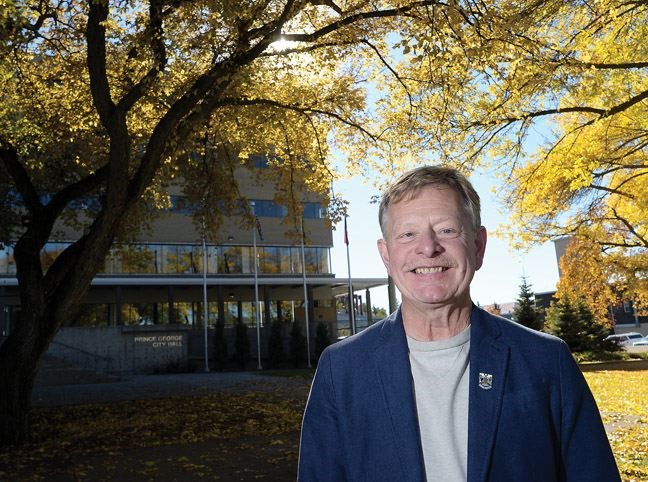Coun. Murry Krause is retiring from half of the activities that have made him a pillar of the community.
The Citizen of the Year alumnus has been a longtime city councillor and is also the current chair of the Union of B.C. Municipalities (the provincial coalition of cities, towns, districts and First Nations).
That part of his life will continue unabated and, he said, will probably pick up steam because he is winding down the other side of his professional life. He is retiring from his position as executive director of the Central Interior Native Health Society, a job he has held for the past 22 years.
He told The Citizen on Thursday that he had seen too many instances when important agencies had problems when a senior staff person left without a strong succession plan. He didn't want to make that mistake. It will be a slow fade into retirement, he said, because he is going to hold the position until a suitable replacement can be found, and then he will also stay on after that as a consultant as needed.
"I will be here to assist with the transition," he said.
"We want this to be a healthy separation. This is not a job to retire into, it is a job requiring a lot of vision and energy, and the agency has to go to its next level. I want that for this place, so we are planning for it quite carefully."
The agency was only two years old when Krause was brought in as the executive director, taking over from founding executive director Harold Morin. The agency was established as a frontline response to urban aboriginal health issues that were falling through the cracks of the mainstream medical system of the day. It was a collaboration between a group of concerned local aboriginal leaders and the provincial government.
It started with one doctor, one nurse, one medical office assistant and one social worker. Today it now has a team of 25, including more of the core professions it began with and a myriad other programs and services aimed at improving the health and wellness of the overall community by focusing on the aboriginal and street-level specialities.
"We have really been at the forefront of healthcare implementation. We have been leaders in Western Canada in multidisciplinary service delivery," Krause said. "We are strong advocates and believers in the multidisciplinary model, and that always has to evolve and change with society and with available resources and with the economy because you are wrapping services around individuals and that is ever-changing in any community."
The agency will go into its 25th anniversary year with a new leader and the veteran standing by to help. One of the things not yet accomplished on Krause's list of goals for the CINHS is to build a central social/medical wellness centre that would house all their services plus others in the community in a one-stop-shopping kind of facility that would also make urban planning sense.
"I will be continuing to support that concept," he said. "It's a matter of resources. It's a big expenditure. There is a review underway right now of downtown health services, and that is one avenue I have to continue to be a champion for that kind of model."
He will be able to concentrate heavily on all of his municipal government matters, once his retirement comes to full effect. He is not going to run as a candidate for other levels of government, he clarified, but he is not planning to scale back his councillor's duties. On the contrary, he wants to invest a lot of energy in his UBCM position and the issues of local government.
If anything, he might need to pour himself into those duties, out of separation grief from his daily job.
"That's the thing, it's not easy to leave (CINHS) by any means," he said, especially since it has never faded from his grateful mind that he was a non-aboriginal applicant for an aboriginal-centric job, those 22 years ago, and he has felt nothing but support from the agency's board ever since.
"My heart is here, my passion is here, but I'm now almost 67 and you want the future of this thing you love to be bright and always progressing, or you should, so that means bringing on that next evolution even though it won't include you, anymore, day to day."



